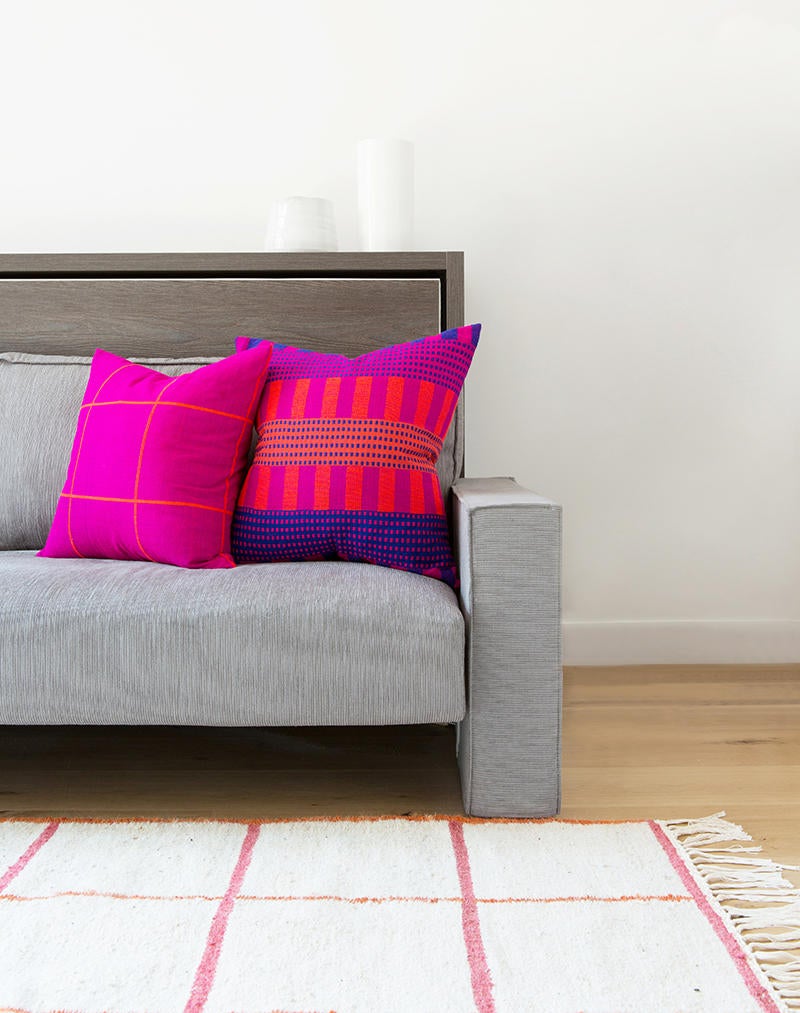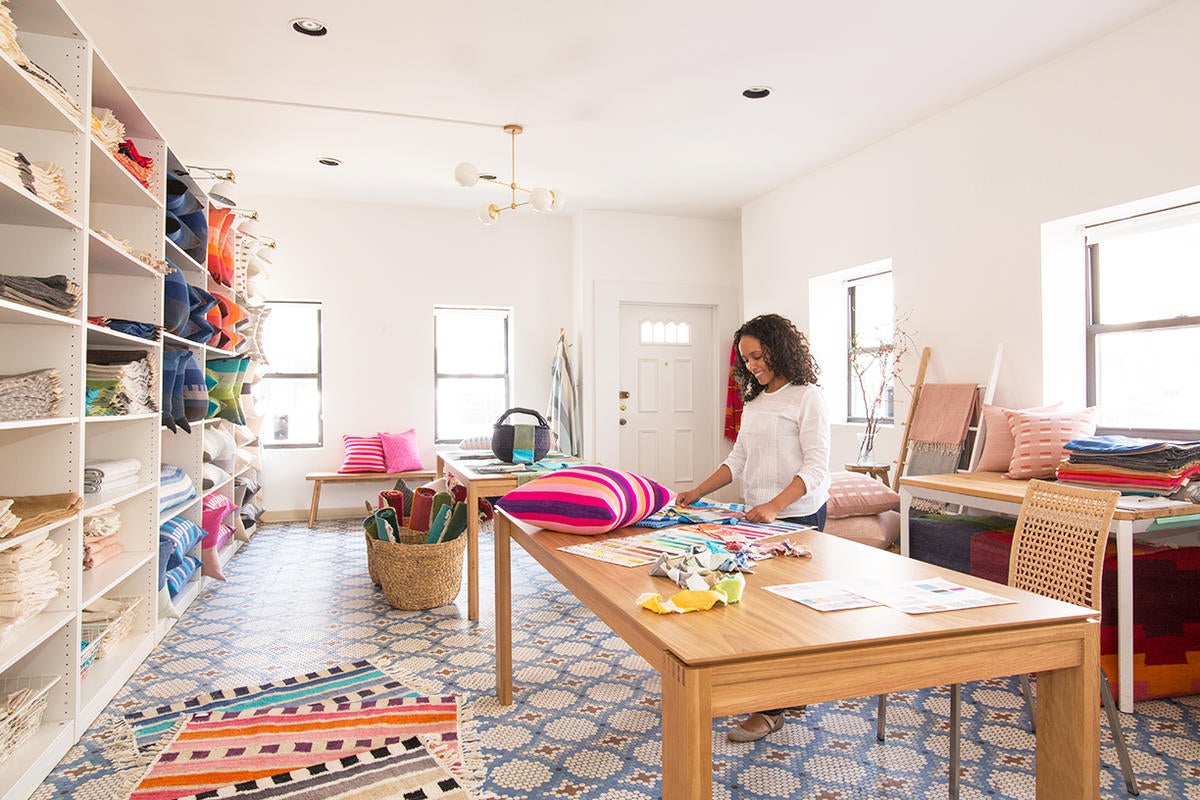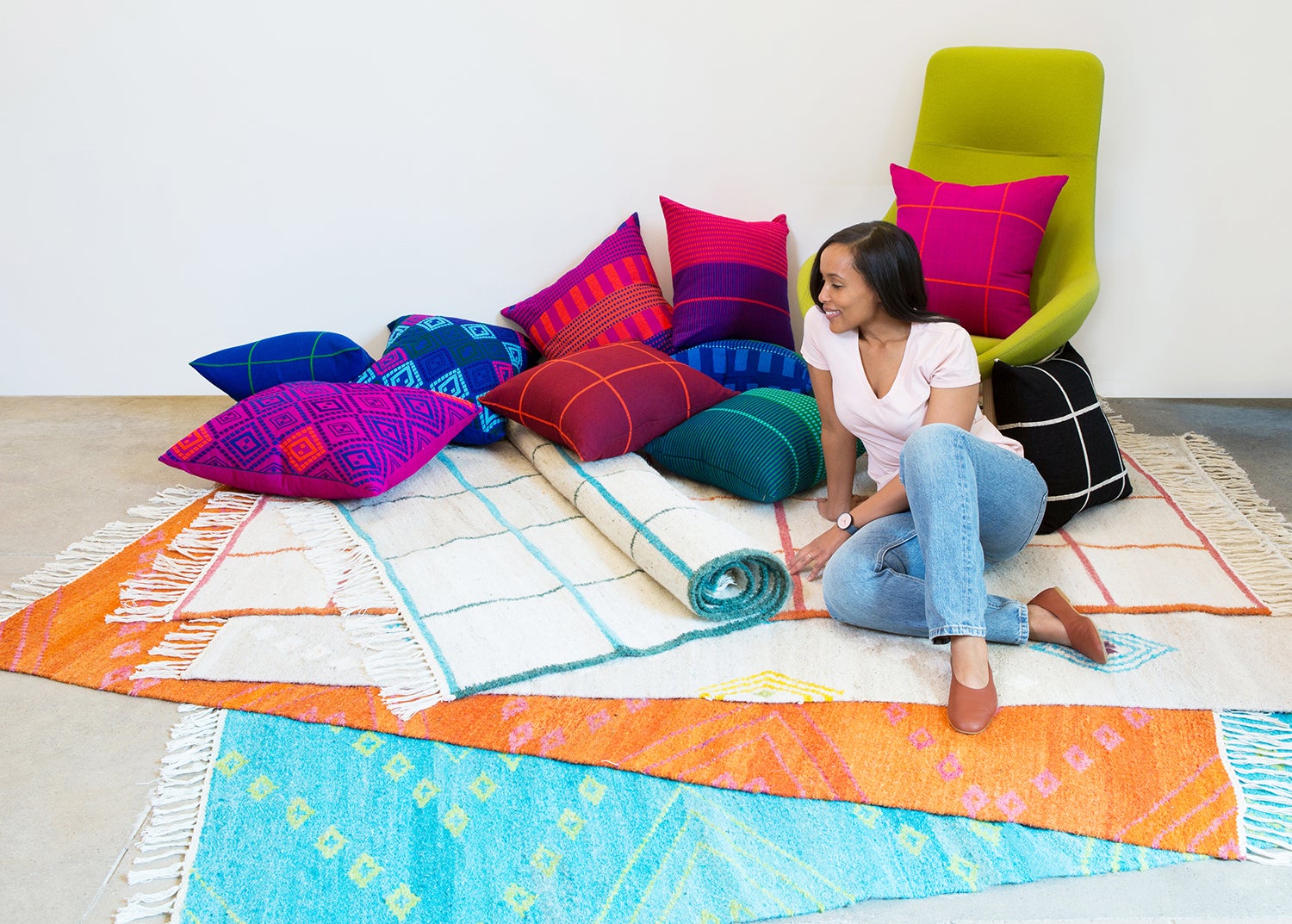It might not seem ideal to split a small business across two continents—but for textile designer Hana Getachew it’s essential. To produce her collections of ethically sourced handwoven pillows, throws and linens, the Kingston, New York–based owner of Bolé Road Textiles collaborates with artisans living and working in Ethiopia. For Getachew, the thread has always been there.
Her family left their home in Ethiopia when she was 3, relocating first to Canada for a few years before settling in New York. It wasn’t until Getachew was in college that she returned to her home country to visit family and experienced a deeper cultural immersion. “It ended up being this pretty powerful homecoming that I didn’t anticipate,” she tells Business of Home. “It was seeing all that in its original form, in its undiluted and un-Americanized form, that was really powerful—to go to the source.”
After graduating from Cornell University with a degree in interior design, Getachew spent 11 years at an architecture firm designing commercial interiors and office spaces. Still, she couldn’t shake the impression her trip to Ethiopia had made on her. In 2014, she quit her job and took the plunge—traveling down Bolé Road in her birthplace of Addis Ababa, she hit the pavement to find the partners with whom she would launch her textile business.

“Here I am, I don’t have any credentials, I don’t have a business, and I don’t have a lot of funds. … In retrospect, it’s kind of comical,” she says. “I stuck with the people who were curious and interested and didn’t brush me away.”
Those same artisans and vendors Getachew encountered on that trip are still working with Bolé Road Textiles today. The decision to partner with artisans based in Ethiopia was partly a matter of quality—the weaving looms there differ from those commonly used in the West, requiring a high skill level to create the intricate geometric patterns featured on many of the brand’s pillows. Plus, there’s no formal training for this method—the weavers and artisans, who are predominantly male, are taught by their fathers and grandfathers. Women more frequently serve as the business owners of textile workshops, many of which are formed as collectives that divide labor and share profits equally—including Bolé Road’s partner company.
In most cases, Getachew’s design process begins with a place. Take, for example, the Harar collection, inspired by a city in eastern Ethiopia. The vibrancy of the town’s bustling markets and colorful dress is juxtaposed with the centuries-old walls surrounding it. “How would I create a collection that tells the story of Harar?” says Getachew. “It became these geometric forms from the rigid architecture, to a lot of bold, bright colors from the streetscape.” The result is a striking collection of textiles in vibrant, deeply saturated hues—think fuchsia, cobalt and maroon—marked with lively patterns of intersecting lines.
Since Bolé Road made its debut at the Brooklyn Designs show in 2015, the company’s growth has varied from year to year. However, according to Getachew, that changed this summer—largely due to the push to support Black-owned businesses in the wake of George Floyd’s death and the racial reckoning that followed. She experienced such an outpouring of press inquiries, orders, and requests for partnerships beginning in June 2020 that she began to have frank conversations with those reaching out to her about issues of equity and representation.
“My response has evolved,” she says. “At first, I was just overwhelmed. I came to the conclusion that it will start to feel manageable and digestible if the cards were out on the table—if we were more transparent [in] talking about the bigger context about why this person was across the screen from me.”

Getachew also began to reflect on her own experiences—including the lack of representation during her early years in corporate architecture. She called some of her old colleagues and clients and began a series of conversations that would form the basis of the International Interior Design Association of New York’s newly founded Equity Council, whose mission is “to achieve equity and accountability toward increased diversity and inclusion in the design industry.” Though still in its early stages, the group recently brought on consultants from Racial Equity Partners. It also plans to distribute a pledge later this year, which Getachew says will borrow inspiration from the 15 Percent Pledge (a commitment by retailers to buy 15 percent of their merchandise from Black-owned businesses), while also including steps companies can take to create a more equitable workplace.
“If I’m gaining so much benefit from this moment, I want to make sure that it’s not just me, and [that] more attention will be paid to Black designers and Black business owners,” says Getachew. “That can really only happen if retailers and businesses and brands are continuing to have a conversation about equity and what that looks like in their organizations.”
The designer also has her eyes on creating a new collection sometime in 2021, though for now, she’s focusing on selling through her online store, as well as producing several pillows and rugs for Design Within Reach. She’s still just as committed to lifting up designers in the U.S. as to supporting artisans in Ethiopia—after all, she considers herself a denizen of both countries.
It all goes back to her first return trip to Africa. “I didn’t feel like, Oh, this is where I belong,” she says. “It was more like, This too is my home.”
To learn more about Hana Getachew, visit her website or find her on Instagram.
Homepage image: Hana Getachew | Courtesy of Bolé Road Textiles





























